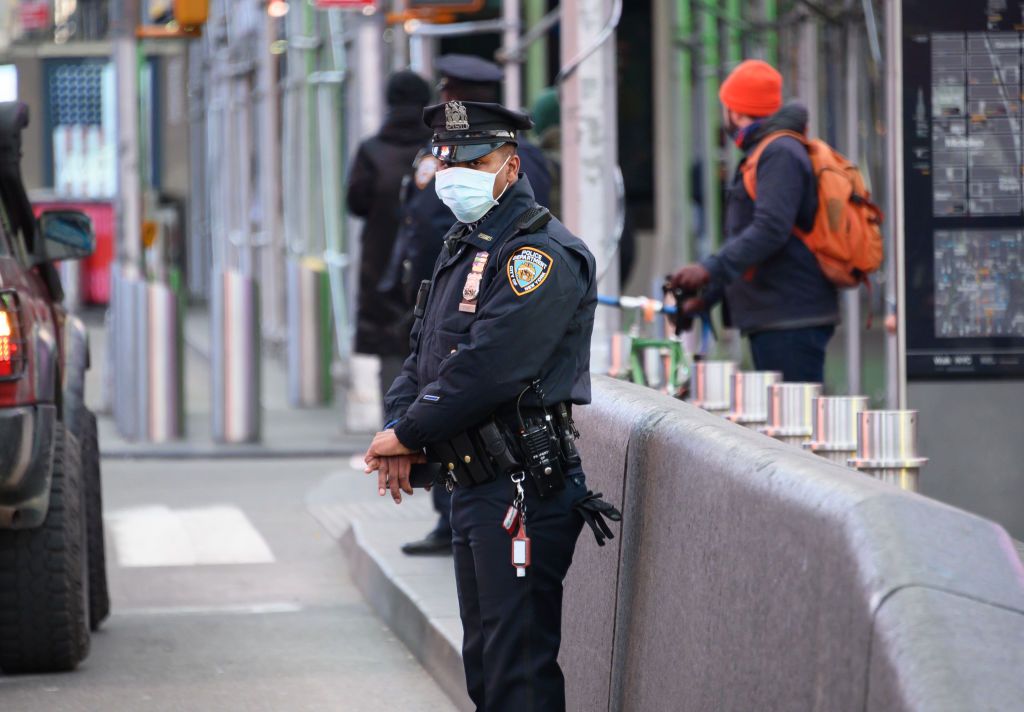
Source: Noam Galai / Getty
While some law enforcement agencies around the country have issued directives for officers to stop making arrests for nonviolent crimes in the wake of the coronavirus crisis, the largest police department in America has reportedly bucked that trend and decided it “won’t slow arrests.” The report about the NYPD came as there were more than 12,000 coronavirus cases in New York City — the so-called U.S. epicenter for the COVID-19 pandemic — including a growing number of officers and jail inmates contracting the respiratory disease that has also killed more than 100 people.
“The New York Police chief said his agency won’t slow arrests, even as 98 NYPD employees, including 70 officers, have been diagnosed with covid-19,” the Washington Post reported Sunday. An additional 28 other members of the NYPD have also contracted the coronavirus. Meanwhile, the coronavirus was also spreading in the city’s jails — including the infamous Rikers Island detention complex — even infecting one of its newest inmates, Harvey Weinstein.
Bad weather wont stop our officers from protecting NYC, in fact, nothing will. Today, as always, NYPD cops will be out there patrolling our neighborhoods and keeping people safe. To our essential workers and to those practicing social distancing from home, we have your back. pic.twitter.com/NVLUhYq5Pq
— NYPD NEWS (@NYPDnews) March 23, 2020
“Every single person now trapped on Rikers and other jails throughout New York State, serving short sentences for non-violent and other low-level offenses, will be released shortly anyway,” Scott Hechinger, a public defender in Brooklyn, told the Post. “Why risk turning a couple of months for low-level drug possession or petit theft into a death sentence?”
Perhaps even more troubling than the apparent mishandling of the highly contagious coronavirus both in the city’s police department and its jails was the fact that the Department of Justice “has quietly asked Congress for the ability to ask chief judges to detain people indefinitely without trial during emergencies,” according to POLITICO.
The combination of the coronavirus spreading among law enforcement and inmates along with the prospects of police being able to eliminate due process for suspects while officers don’t slow arrests could be disastrous not just for public health but also for any progress in criminal justice reform. While the New York Daily News did report that some Rikers Island inmates were being released over coronavirus concerns, “Everyone thinks the next person has got it,” a current inmate said.
To be sure, crime in New York City has dropped by about 17 percent since the coronavirus crisis began its tight grip on America, according to the New York Post. But chances are that difference in suspected criminal activity is at least partially a result of people who have decided to stay home and off the streets as recommended by health officials.
Meanwhile, the Philadelphia Police Department last week pledged to stop — not reduce, but end — making arrests for “non-violent crimes” that includes everything from auto theft to all drug offenses to prostitution, and much more. Fox 29 reporter Steve Keely tweeted that the president of the union that represents police officers in Philadelphia said the new department-wide guidance “will help prevent officers from being infected with coronavirus.”
For those who have expressed outrage of my reporting this, the @PhillyPolice have put out a news release on this tonight. They actually want this made known to the public now. This is being done in the interest of the officers’ safety. Below is the news release @fox29news pic.twitter.com/hZBkoAMRlf
— Steve Keeley (@KeeleyFox29) March 17, 2020
Two hundred miles north in New York City, however, new NYPD Commissioner Dermot Shea apparently thinks otherwise despite an increasing number of coronavirus diagnoses among his department’s workforce and behind the bars of the city’s jails.
SEE ALSO:
People Are Blaming Idris Elba And His Wife After She Tests Positive For Coronavirus
Congressional Black Caucus’ Coronavirus Stimulus Proposals Protect Those Who Are Most At-Risk
[ione_media_gallery id=”3914701″ overlay=”true”]
